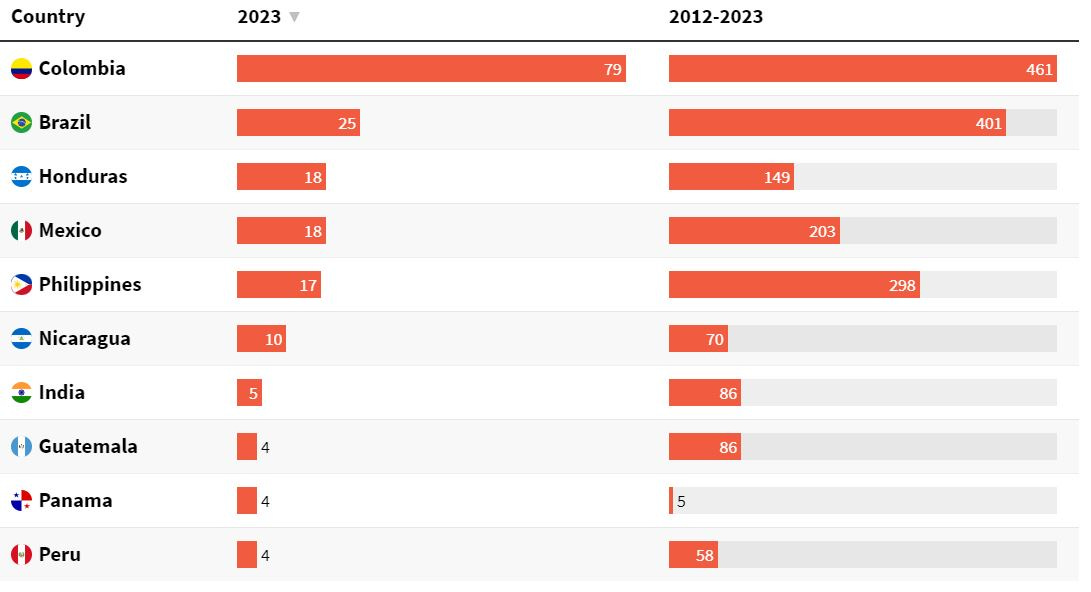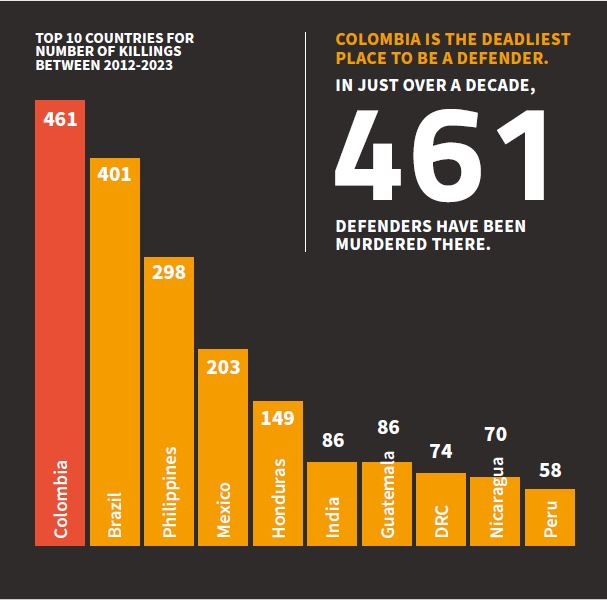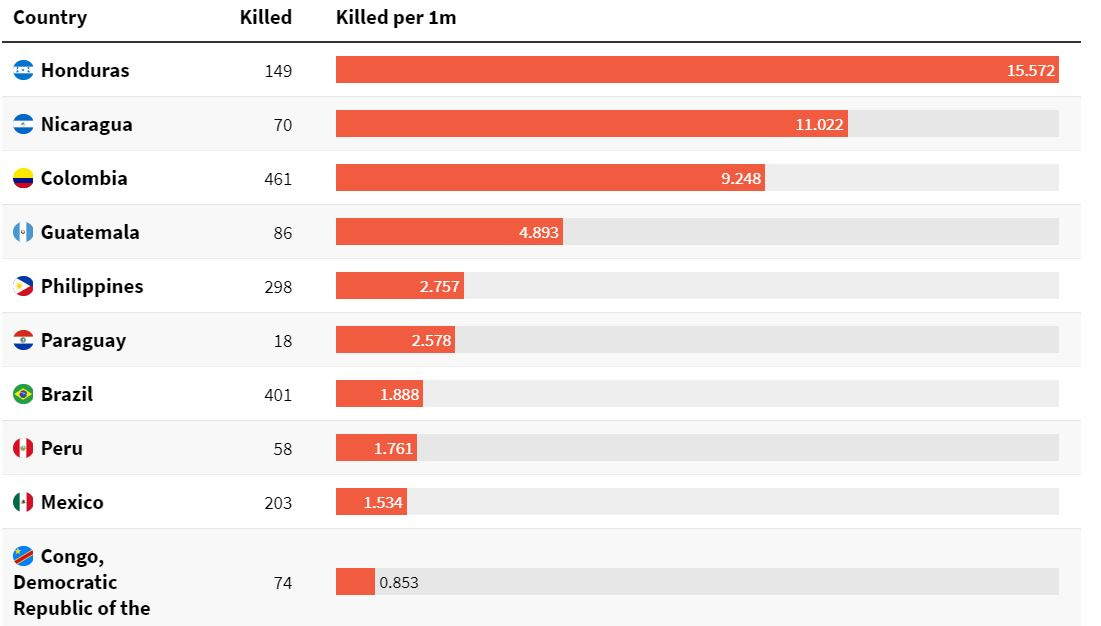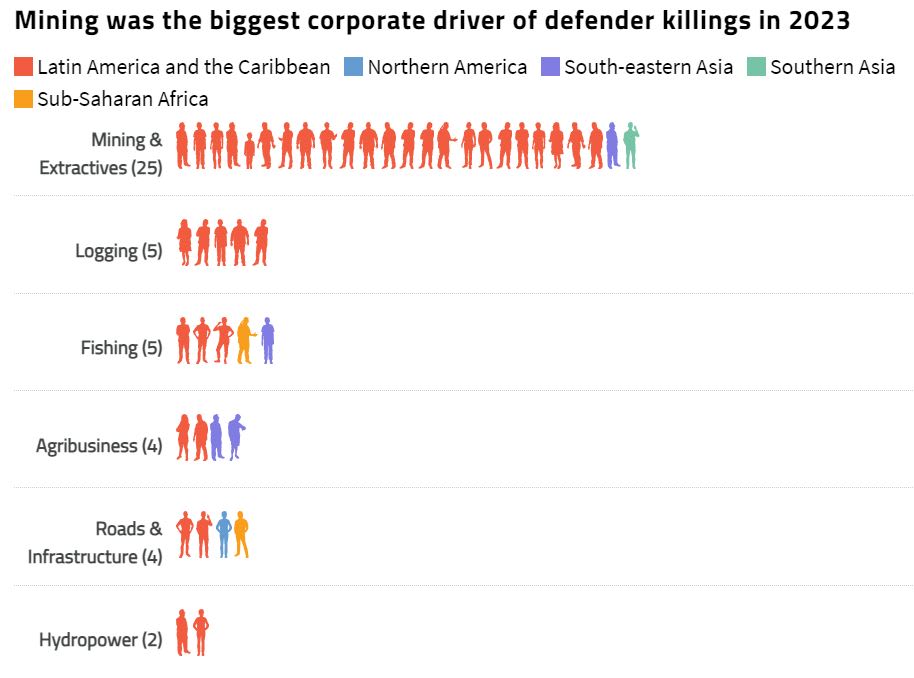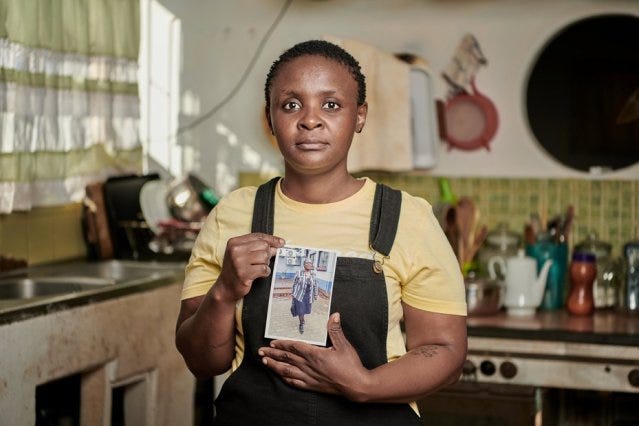Global Witness report: more than 2,100 environmental defenders murdered since 2012
More than 2,100 land and environmental defenders have been murdered since 2012, according to a new report, ‘Missing voices’, published by the London-based non-governmental organisation Global Witness.
At least 196 defenders were killed in 2023, bringing the recorded figure to 2,106 between 2012 and 2023.
“We acknowledge that the names of many defenders who were killed last year may be missing, and we may never know how many more gave their lives to protect our planet,” Global Witness said.
For the second year running, Colombia had the highest number of killings worldwide – with a record 79 defenders killed last year, which is 40% of all reported cases. The total in 2022 was 60. In 2021, it was 33.
The 2023 figure for Colombia is the highest annual total for any country recorded by Global Witness since the NGO began documenting cases in 2012.
“With 461 killings from 2012 to 2023, Colombia has the highest number of reported environmental defender killings globally on record,” Global Witness said.
“Other deadly countries in Latin America include Brazil, with 25 killings last year, and Mexico and Honduras, which both had 18 killings.”
Once again, Latin America had the highest number of recorded killings worldwide, with 166 murders overall in 2023 – 54 killings across Mexico and Central America and 112 in South America.
For just over a decade, environmental defenders in Central America have endured more attacks per capita than anywhere else in the world, with 97% of the recorded killings occurring in the same three countries: Honduras, Guatemala and Nicaragua.
“In 2023, the threat was even more acute: 36 defenders were killed in Central America, almost one in five of the killings we documented globally, in a region with less than 1% of the world’s population,” Global Witness said.
“Central America has emerged as one of the most dangerous places in the world for defenders. With 18 defenders killed in Honduras, the country had the highest number of killings per capita in 2023. A total of 10 defenders were also killed in Nicaragua last year, while four were killed in Guatemala, and four in Panama.”
Honduras had the same number of murders of environmental defenders as Mexico, but has less than a tenth of the population.
“The Honduran organisation ACI-Participa has identified the lack of productive lands for farmers, the prioritisation of extractive activities and the violation of the rights of indigenous and Afro-descendant peoples as key to understanding the prevalence of the attacks in the country,” Global Witness said.
Julia Francisco Martínez stands at the graveside of her husband, Francisco Martinez Marquez, an indigenous activist found murdered in Honduras in January 2015 after months of death threats. Photo credit: Giles Clarke/Global Witness.
In 2018, a manager at the Honduran energy corporation Desarrollos Energéticos SA (DESA), Sergio Ramón Rodríguez Orellana, and a former security chief for DESA, Douglas Geovanny Bustillo, were among seven people convicted for the murder of indigenous defender Berta Cáceres Flores (pictured below), who fiercely opposed DESA’s Agua Zarca dam project and was killed in March 2016 after years of threats.
Land and environmental defenders killed from 2012–2023 per one million population
Worldwide, indigenous peoples and Afro-descendants continue to be disproportionately targeted, accounting for 49% of the total murders of environmental defenders, Global Witness reports.
All ten murders of environmental defenders that Global Witness registered in Nicaragua in 2023 were of members of indigenous communities, as were 69 of the 70 killings documented between 2012 and 2023.
Environmental defenders are also being increasingly subject to range of tactics for silencing those who speak out for the planet across Asia, the European Union, the United States, and the United Kingdom, the NGO adds.
In Asia, 468 environmental defenders were murdered between 2012 and 2023. Sixty-four percent of the killings were in the Philippines (298 murders). There were 86 killings recorded in India, twenty in Indonesia, and 13 in Thailand.
Global Witness recorded 17 killings of environmental defenders in the Philippines in 2023, five in India, and three in Indonesia.
Senior adviser to the Land and Environmental Defenders Campaign at Global Witness Laura Furones said: As the climate crisis accelerates, those who use their voice to courageously defend our planet are met with violence, intimidation, and murder. Our data shows that the number of killings remains alarmingly high, a situation that is simply unacceptable.
“Governments cannot stand idly by; they must take decisive action to protect defenders and to address the underlying drivers of violence against them. Activists and their communities are essential in efforts to prevent and remedy harms caused by climate-damaging industries. We cannot afford to, nor should we tolerate, losing any more lives.”
Establishing a direct relationship between the murder of a defender and specific corporate interests remains difficult, Global Witness says. However, the NGO has identified mining as by far the biggest industry driver of killings of environmental defenders. Twenty-five defenders were killed after opposing mining operations in 2023, Global Witness reports.
The NGO lists five murders related to the fishing industry, five related to logging, four related to agribusiness, four related to opposition to the construction of particular roads and infrastructure, and two related to the hydropower industry.
Twenty-three of the 25 mining-related killings globally in 2023 were in Latin America, Global Witness reports.
“More than 40% of all mining-related killings between 2012 and 2023 occurred in Asia, which is home to significant natural reserves of key critical minerals vital for clean energy technologies,” the NGO added.
As well as highlighting the number of killings worldwide, ‘Missing voices’ unearths wider trends in non-lethal attacks and their harmful impacts on communities globally.
It reports on cases of enforced disappearances and abductions, which are tactics used in the Philippines and Mexico in particular, as well as the wider use of criminalisation as a means of silencing activists across the world.
The new report also draws attention to the crackdown on environmental activists across the UK, Europe, and the US, where laws are increasingly being weaponised against defenders and harsh sentences are being more frequently imposed on people involved in climate protests.
“The findings form part of a concerning trend of criminalisation cases emerging worldwide,” Global Witness said.
Four demonstrators were killed in Panama in 2023 and, in the US, a police officer shot dead an environmental defender who was demonstrating against the destruction of a local forest to make way for a police training complex.
Author of the foreword to ‘Missing voices’ and winner of the 2024 Goldman Environmental Prize Nonhle Mbuthuma said: “Across every corner of the globe, those who dare to expose the devastating impact of extractive industries – deforestation, pollution, and land grabbing – are met with violence and intimidation. This is especially true for indigenous peoples, who are essential in the fight against climate change yet are disproportionately targeted year after year.”
Mbuthuma, who for years has been subjected to death threats, brutality, criminalisation and harassment, said the brutality of the attacks on environmental defenders revealed something profound: “the power that ordinary people wield when they unite for justice”.
Defenders and their communities were exposed to an ever-evolving range of reprisals, many of which were hidden from view, or worse, were ignored, she wrote in her foreword.
“When I look at my country, so rich in resources yet so unequal, I can clearly see that natural resource extraction is oppressing rather than supporting citizens. The exploitation of people and the environment has its roots in colonial violence, racism, and injustice,” she added.
“Our ancestors understood the power of informing, educating, and mobilising people. And they made history by putting such power to use.”
Latin America
Global Witness reported that the overwhelming majority of attacks on environmental defenders in Colombia in 2023 were in the southwestern regions of Cauca (26), Nariño (9), and Putumayo (7).
“A mix of coca cultivation, drug trafficking and armed conflict has devastated these regions, with defenders and communities often caught in the crossfire,” the NGO said.
“Organised crime groups are suspected to be the perpetrators of half of all defender murders in Colombia in 2023.”
While the government of President Gustavo Petro has made commitments to reduce violence, these have not yet led to a decrease in reprisals against some of the country’s most vulnerable activists and communities, Global Witness says.
“On the contrary, violence against human rights defenders and social leaders appears to be increasing, with the Colombian organisation Programa Somos Defensores reporting no significant improvement in overall trends,” the NGO added.
“The Colombian government has a historic opportunity to address these challenges as the host of the Convention on Biological Biodiversity (CBD COP), which will be held in October 2024.”
In Mexico, more than 70% of the environmental defenders murdered in 2023 were from indigenous communities. Most of them opposed mining operations in the region.
“In contrast with Colombia, we were able to connect over 40% of killings in Mexico in 2023 to defenders opposing mining operations,” Global Witness said.
“Beyond murders, Mexico has also experienced a significant number of enforced disappearances, a particularly vicious form of violence typical, though not exclusive, to this country.”
The number of killings of defenders in Brazil decreased from 34 in 2022 to 25 last year, Global Witness reports. More than half of those killed were from indigenous communities and four were Afro-descendants.
“The incoming president, Luiz Inácio Lula da Silva, faced high expectations to reform regressive policies introduced by his predecessor, Jair Bolsonaro, whose presidency was characterised by laws that opened the Amazon to exploitation and destruction,” Global Witness said.
“So far, there has been progress. The government has restored funding to protect the Amazon and reinstated the indigenous affairs agency that Bolsonaro dismantled. Yet policy changes remain challenging in the face of a conservative Congress dominated by ruralistas, who support the interests of private landowners over public agrarian reform.”
Attacks in Asia
In addition to the murders of environmental activist in Asia, non-lethal attacks are being increasingly used as tactics to suppress activism across the region, Global Witness reports.
“Forum Asia identified judicial harassment as the most recorded violation against human rights defenders in Asia in 2021 and 2022, documenting 1,033 incidents,” the NGO said.
“Global Witness has reported seven enforced disappearances in the Philippines, with the trend appearing to extend to other countries in 2024.
“The abduction of land and environmental defenders in Southeast Asia has emerged as a critical issue, reflecting broader systemic efforts by power holders to suppress dissent and maintain control over land and resources.”
Filipina activist Jonila Castro, who was abducted by the Philippines military in 2023 and is currently facing criminalisation, told Global Witness: “Even after our release from abduction, threats continued. We are facing difficulties in returning to our homes and communities. We are still experiencing surveillance, red-tagging, and intimidation. Attacks to silence environmental defenders challenge our advocacy for environmental protection and people’s rights.
“Environmental devastation and human rights violations are interconnected, both sustained by governments and the extractive systems they defend.
“Our experience highlights the urgent need for stronger protection and recognition of community activists and environmental defenders in the global fight for climate justice.”
Jonila Castro, who has been a leading campaigner against large land reclamation projects in Manila Bay, takes part in an Independence Day protest in Manila in June 2024. Photo credit: Raffy Lerma/Global Witness.
Africa
Global Witness has recorded the murders of two environmental defenders in the Democratic Republic of Congo, one in Rwanda and one in Ghana in 2023.
Between 2012 and 2023, 116 defenders were murdered in Africa, most of them park rangers in the Democratic Republic of Congo (74), the NGO reports. The NGO has also documented six killings in Kenya, six in South Africa, five in Chad, five in Uganda, three in Liberia, and two in Burkina Faso, among other countries.
“These chilling figures are most likely a gross underestimate as access to information continues to be a challenge across the continent,” Global Witness said.
In her foreword to ‘Missing voices', Mbuthuma writes about South Africa’s marine environments. "Like many peoples and cultures worldwide, the indigenous peoples of the Eastern Cape find solace and leisure in our oceans," she says.
“But to us, they are more than sandy shores and turquoise waters. They are a vital food source and a lifeline for millions of people. They are home to many endemic marine species. They are sacred places, with deep cultural meaning that stretches back generations.”
Mbuthuma has been a leading campaigner against plans by the oil and gas giant Shell to carry out months of seismic blasting in 6,000 square kilometres of biodiverse coastal waters in Maputaland-Pondoland, Albany.
“Together, ordinary people – including families, activists, journalists, lawyers – worked to show our government that there is another, more equitable path to power the future. Our message resonated beyond our coastal towns, and our movement quickly swept across the world,” she said.
“We were up against a multinational company and a government that had been supportive of its plans. Regardless, we took Shell and our government to court. And our perseverance and determination paid off.”
In September 2022, the Eastern Cape Division of the High Court of South Africa revoked Shell’s exploration rights and ruled that conducting seismic surveys on the Wild Coast of South Africa was unlawful.
“This was a landmark decision and a historic win for us,” Mbuthuma said. “We felt vindicated. But our joy was short-lived. The judgement was quickly appealed, and we are waiting to learn the date of the next hearing.”
Malungelo Xhakaza holds a photograph of her mother, Fikile Ntshangase, who was killed in 2020 after opposing the expansion of a coal mine bordering the community of Somkhele, South Africa. Photo credit: Thom Pierce/Global Witness.
Despite the escalating climate crisis – and governments pledging to achieve the Paris Agreement target of 1.5C – land and environmental defenders are being increasingly subject to a wide range of attacks to stop their efforts to protect the planet, Global Witness says. “At least 1,500 defenders have been killed since the adoption of the Paris Agreement on December 12, 2015,” the NGO said.
Nonhle Mbuthuma added: “Leaders have a duty to listen and ensure that land and environmental defenders can speak out, everywhere, without fear of reprisal. This responsibility falls squarely on the shoulders of every wealthy and resource-rich nation worldwide.”
Global Witness says, that, to protect environmental defenders, countries need to systematically document attacks and reprisals. New and better data on these attacks and their causes would enable governments to improve existing laws and mechanisms, the NGO says, but given the limited progress made so far, urgent acceleration is needed.
“Legally binding mechanisms like the Escazú Agreement in Latin America require governments to guarantee access to information, public participation, and justice,” Global Witness said.
“But globally, governments and the companies that operate within their borders must do more to bring to light attacks against defenders and their communities, and put an end to the violence.
“Governments and companies must also be held to account for the violence and criminalisation that land and environmental defenders face around the world.”
Indigenous groups protest at COP28 in Dubai in 2023. Photo credit: Jasmin Qureshi/Global Witness.
This article is also available on my Changing Times website.




